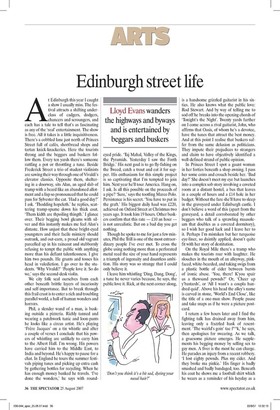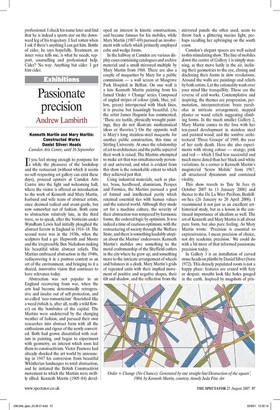Edinburgh street life
Lloyd Evans wanders the highways and byways and is entertained by beggars and buskers At Edinburgh this year I caught a show I usually miss. The festival attracts a shifting underclass of cadgers, dodgers, chancers and scroungers, and each has a tale to tell that's as fascinating as any of the 'real' entertainment. The show is free. All it takes is a little inquisitiveness. There's a cobbled lane just north of Princes Street full of cafés, shortbread shops and tartan knick-knackeries. Here the tourists throng and the beggars and buskers follow them. Every ten yards there's someone rattling a pot or throttling a tune. Beside Frederick Street a trio of student violinists are sawing their way through one of Vivaldi's elevator classics. Opposite them, sheltering in a doorway, sits Alan, an aged slab of tramp with a beard like an abandoned allotment and a lisp so pronounced that he could pass for Sylvester the cat. 'Had a good day?' I ask. `Thodding hopeleth.' he replies, scattering tramp-spume down his thick coat. 'Them kidth are thpoiling thingth.' I glance over. Their begging bowl gleams with silver and this instantly makes me feel Alan's distaste. How unjust that these bright-eyed youngsters and their facile mimicry should outrank, and out-earn, a proud old vagrant parcelled up in his raincoat and stubbornly refusing to tempt the public with anything more than his defiant talentlessness. I give him two pounds. He grunts and tosses his head in valediction. I go over to the students. 'Why Vivaldi?' People love it. So do we,' says the second-desk violin.
We city folk seal ourselves from each other beneath brittle layers of incuriosity and self-importance. But to break through this frail crust is to enter a rich and troubling parallel world, a hall of human wonders and horrors.
Phil, a slender wand of a man, is busking outside a pizzeria. Richly tanned and wearing a patchwork tunic and loon-pants he looks like a circus artist. He's playing Trere Jacques' on a tin whistle and after a couple of verses I conclude that his powers of whistling are unlikely to carry him to the Albert Hall. I'm wrong. His powers have carried him to the Middle East, to India and beyond. He's happy to pause for a chat. In England he tours the summer festivals piping tunes and picking up extra cash by gathering bottles for recycling. When he has enough money banked he travels. 'I've done the wonders,' he says with roundeyed pride. 'raj Mahal, Valley of the Kings, the Pyramids. Yesterday I saw the Forth Bridge.' His next goal is to go fly-fishing on the Tweed, catch a trout and eat it for supper. His enthusiasm for this simple project is so captivating that I'm tempted to join him Next year he'll tour America. Hang on, I ask. Is all this possible on the proceeds of a pipe? 'Sure,' says the tootling Marco Polo. Persistence is his secret. 'You have to put in the graft.' His biggest daily haul was £220, achieved on Oxford Street at Christmas two years ago. It took him 19 hours. Other buskers confirm that this rate — £10 an hour — is not unrealistic. But on a bad day you get nothing.
Though he spoke to me for just a few minutes, Phil the Trill is one of the most extraordinary people I've ever met. To cross the globe using nothing more than a perforated metal reed the size of your hand represents a triumph of ingenuity and dauntless ambition. His story was so strange that I could only believe it.
I leave him whistling 'Ding, Dang, Dong', a tune he never varies because, he says, the public love it. Rick, at the next corner along, is a handsome grizzled guitarist in his sixties. He also knows what the public love: Rod Stewart. And by way of telling me to sod off he breaks into the opening chords of 'Tonight's the Night'. Twenty yards further on I come across a rival guitarist, John, who affirms that Oasis, of whom he's a devotee, have the tunes that attract the best money. And at this point I realise that buskers suffer from the same delusion as politicians. They impute their prejudices to strangers and claim to have objectively identified a well-defined strand of public opinion.
In Princes Street I spot a gaunt woman in her forties beneath a shop awning. I pass her some coins and crouch beside her. 'Bad day?' She doesn't meet my eye but launches into a complex sob story involving a coveted room at a distant hostel, a bus that leaves in a couple of hours and a £14 hole in her budget. Without the fare she'll have to sleep in the graveyard under Edinburgh castle. I don't believe a word of this (apart from the graveyard, a detail corroborated by other beggars who talk of a sprawling mausoleum that doubles as a covered dormitory), so I wish her good luck and I leave her to it. Perhaps I'm mistaken but her turquoise eye-liner, so daintily applied, doesn't quite fit with her story of destitution.
On the Royal Mile there's a tramp who makes the tourists roar with laughter. He slouches in the mouth of an alleyway, pinkfaced, white-bearded, and taking swigs from a plastic bottle of cider between bursts of ironic abuse. 'You, there! K'you spair us a thewsand pewnds?' Or, 'Cheer up y'bastards', or 'All I want's a coupla hundred quid'. Above his head the alley's name is carved in stone, World's End Close', like the title of a one-man show. People pause and take snaps as if he were a picture postcard.
I return a few hours later and I find the fighting talk has drained away from him, leaving only a frazzled husk of resentment. 'The wairld's goin' tae f**k, he says, then apologises for swearing. As we talk, a gruesome picture emerges. He supplements his begging money by selling sex to gay men. A fiver is the most he can charge. He parades an injury from a recent robbery. 'I lost eighty pewnds. Plus my cider. And they broke ma pinkie.' His finger is badly smashed and badly bandaged, too. Beneath his coat he shows me a football shirt which he wears as a reminder of his heyday as a professional. I check his name later and find that he is indeed a sports star on the downward leg of his trajectory. I feel rotten when I ask if there's anything I can get him Bottle of cider, he says hopefully. Treatment, an inner voice tells me, is what he needs, support, counselling and professional help. Cider? No way. Anything but cider. I get him cider.










































 Previous page
Previous page